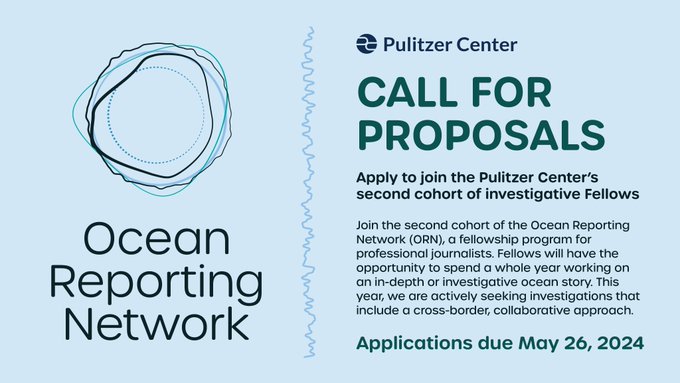
2024 Pulitzer Center Ocean Reporting Network Fellowship Programme
Deadline: May 26, 2024.
The Pulitzer Center, a global organization that supports independent, innovative journalism, is now accepting applications for its Ocean Reporting Network (ORN). Applications are now open to join the second cohort of the Ocean Reporting Network (ORN), a fellowship program that gives professional journalists the opportunity to spend a whole year working on an in-depth or investigative ocean story.
A healthy ocean is vital to tackling the existential environmental threats of global warming, pollution, and biodiversity loss. Covering more than two-thirds of the planet, the world’s waters absorb carbon dioxide and heat, and produce half the oxygen we breathe. The ocean provides a habitat for countless plants and animals. Billions of people rely on fish in their daily diet, and the fishing industry provides employment and income around the world.
ELIGIBILITY CRITERIA
- Experienced journalists with a proven track record of investigative or in-depth ocean or environmental reporting.
- Journalists with a solid understanding of ocean issues and the scientific, environmental, social, legal, political, and commercial forces at play—and why these issues matter to our global well-being.
- Staff or freelance journalists working on various platforms, including print, radio, video, and multimedia. Freelance reporters must have the support of a local or international newsroom that agrees to host them and publish the work they produce during the Fellowship.
- Team players with the experience and ability to work collaboratively across newsrooms and borders, and the willingness to learn new skills.
- Reporters who are motivated to participate in outreach activities related to their investigations, such as meetings in communities and visits to schools and universities.
- They want compelling, impactful, innovative, and well-developed story ideas that can be followed over the course of a year—not just a one-off story, or coverage of a general topic.
- Experienced environmental journalists—freelancers or staff—working with local, regional, or international media outlets in online, print, radio, and video format.
- Teams of journalists proposing cross-border collaborations.
- Dedicated team players who will devote a full year to their ocean investigation and publish regularly following a timeline decided together with the Pulitzer Center and their editors.
BENEFITS
- Access to data and documents as well as the opportunity to sharpen your data skills with support from the Pulitzer Center’s Data and Research team.
- Specialized training opportunities such as the use of satellite imagery and other digital tools in investigations, corporate and follow-the-money research, and more.
- The opportunity to work and collaborate with other journalists on stories that transcend your country and region and can achieve true global impact.
- A community of like-minded colleagues that will continue beyond your Fellowship.
- The possibility of renewing your Fellowship for an additional one or two years, based on performance.
- Salaries commensurate with experience.
Please note that selected candidates will work remotely.
APPLICATION
- A copy of your résumé or curriculum vitae.
- A description of the investigative or in-depth reporting project you seek to pursue during your Fellowship. Please do not propose general themes, but concrete stories that aim to uncover patterns of wider, systemic wrongdoing/abuse that is underreported or hidden. It is expected that by the time you apply, you will have already undertaken some pre-reporting to determine the scope, feasibility, and novelty of the project. A compelling, well-researched project proposal with a reporting plan will help you stand out among hundreds of applicants. If the investigation includes a cross-border approach, explain your collaboration plan and identify partners outside and within the network. (800 words)
- A plan for how your project will be published and distributed, which audiences you want to reach, and how you will engage them. (500 words)
- A statement of purpose: How does this Fellowship fit in with your career path and why you are best positioned to be a Ocean Reporting Network Fellow. (500 words)
- A plan on how to engage the communities affected by the issue of your reporting and the decision-makers that might use your reporting to improve regulation or business practices.
- A letter of support from your media employer or a newsroom that has agreed to host you as a Ocean Reporting Network Fellow and publish your work.
- Three examples of your most impactful investigations published in the past three-five years.
- Three professional references or letters of recommendation.
Apply through the OFFICIA LINK



